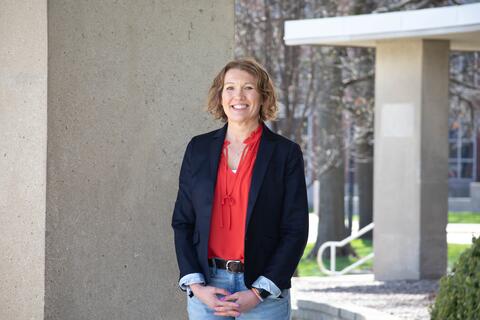
Central to youth development programs is “spark,” a term that describes the process of enkindling a self-discovered skill, talent or interest that may lead to fulfillment or a greater sense of purpose. According to a common model of 4-H youth development, “spark” can put young people on the path to thriving.
Amy Leman, an assistant professor in the Agricultural Leadership, Education and Communication Program (ALEC) and Collaboratory member at the Family Resiliency Center (FRC), wants to take “spark” to the next level.
Through youth participatory action research, or YPAR, Leman welds the passion of spark to a focus on one’s community, channeling spark in the direction of policy change.
“How can we involve youth as part of the research to understand that there’s power in their thoughts and knowledge already?” asked Leman, “Youth participatory action research helps them realize their power and, in turn, think critically about their community.”
The YPAR model encourages youth to identify a problem in their life or surroundings, design and carry out research on that problem, and then apply their conclusions and analysis to their community. The hope is that involving young people in a research project that is grounded in their lived experience will allow them to feel the practical effects of applying their individual interests to benefit other students or residents in their local communities.
“Research should be participatory because the participants are the ones that need to speak,” Leman said, “So unless we are figuring out how to give participant voice themselves, we’re not doing justice to the topics we’re studying.”
Leman’s enthusiasm for YPAR is grounded in decades of experience in youth development. Prior to her faculty appointment in ALEC, Leman spent nearly twenty years working with University of Illinois Extension—first as a 4-H youth development educator in Decatur and later at the state office in Champaign as an evaluation and professional development specialist. Those experiences showed Leman that her research interests were in the learning contexts as much as in the curricular content.
“I’m a bit of an anomaly in agricultural education, where a significant amount of attention is paid to teacher retention. Of course, that is certainly part of my work—for example, with programs supporting early-career and alternatively certified teachers in Illinois,” Leman said, “But teaching kids to be critical thinkers also requires training out-of-school time providers in assessing developmental relationships and in growing comfortable teaching science and skills.”
This focus on training the adults that make up a child’s context—instructors and volunteers who can recognize and nurture spark—is a critical aspect of YPAR’s capacity-building strategy. Recently, Leman partnered with FRC Director Jacinda Dariotis and multiple Extension collaborators—Zach Kennedy, an Extension Specialist in Community and Economic Development, and Extension Educators Mynda Tracy, Ben Stelle, Kristi Stout and Valerie Belusko—on an Extension Collaboration Grant to design a 10-module playbook to guide Extension educators and volunteers from across the state in how to facilitate programs that work with young people as research partners. This “train-the-trainer” model will build capacity among these adults, preparing them to lead YPAR programs that give youth voice and choice.
The collaboration is an ideal union of approaches and resources: as a partnership that allows Extension and the FRC to tap into each other’s community relationships, it’s an exciting opportunity to continue to build capacities and generate momentum for YPAR programs regionally and nationwide.
Leman agreed that the partnership between Extension and the FRC was a natural fit.
“Something I truly believe in is agricultural education’s three-circle model and ecological models of youth development, where an individual is influenced by different layers—their school, home and society, if you're talking about youth,” said Leman, “The FRC, too, is looking ecologically at the world and at how different layers interact. As the direction that the FRC is going, that really appeals to me.”